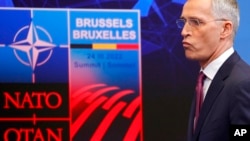Western leaders meeting in Brussels about Russia's ongoing invasion of Ukraine are expected to spend a significant amount of time talking about China.
U.S. security officials say they have yet to see any sign that Beijing is providing Moscow with military equipment or other aid to boost the Russian forces. But Western officials warn China's refusal to condemn Russia's invasion and its willingness to parrot Kremlin propaganda are cause for concern.
"We face a fundamentally changed security environment where authoritarian powers are increasingly prepared to use force to get their way," NATO Secretary-General Jens Stoltenberg told reporters Wednesday, the day before a meeting of the alliance's heads of state.
"Beijing has joined Moscow in questioning the right of independent nations to choose their own path," he added. "So, I expect we will also address the role of China in this crisis."
So far, China has sought to avoid political conflict over the war in Ukraine, saying it recognizes Ukraine's sovereignty while also agreeing with Russia that NATO expansion has raised "legitimate security concerns."
At the same time, analysts caution that China has used social media to echo the Kremlin's talking points about the war.
Posts by Chinese officials and news outlets have "remained largely aligned with Russian messaging," according to analysis by the Washington-based Alliance for Securing Democracy, which tracks online propaganda.
" 'NATO' was the tenth most used key phrase in Chinese tweets last week, as Chinese officials and state media continue to frame potential NATO enlargement as the root cause of Russia's invasion," the alliance said, noting Beijing also repeated Russian disinformation efforts tying the U.S. to biological weapons labs in Ukraine.
But what NATO members find most concerning is Beijing's willingness to side with Moscow against core values such as self-determination, Stoltenberg said.
"China now for the first time has questioned some of the key principles of our security, including the right for every nation in Europe to choose his own path," he said. "That's new.
"I expect the leaders, when they meet tomorrow, to call on China to condemn the invasion and to engage in diplomatic efforts to find a peaceful way to end this war as soon as possible and not provide material support," Stoltenberg said.
Some U.S. lawmakers think Russia's stalled military efforts in Ukraine may be giving Chinese leadership reason to have second thoughts about using force, specifically in relation to Taiwan.
"China is looking at Russia, too, and they're beginning to ask questions," Senate Armed Services Committee Chairman Jack Reed told the Defense Writers Group on Wednesday, noting that China has yet to truly test its newfound military might.
"I think the Chinese are constantly thinking about their posture towards Taiwan," he said. "Now they have some more data. … They might be getting second thoughts."






